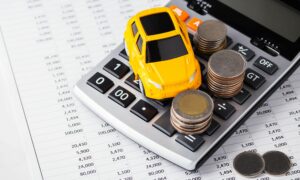Are you wondering who’s going to pay for car lease maintenance? Are the car leasing companies doing it or the lessee? Car leasing is becoming more and more popular, as it offers a lot of advantages over purchasing a vehicle outright. But with any agreement, certain maintenance responsibilities come along with it.
So, who pays for maintenance on a leased car? The answer may surprise you. In this article, we’ll learn more about car lease maintenance and what most lease agreements require. We will also learn what maintenance package that comes with leased cars.
When you sign a car lease contract, you’re agreeing to make monthly payments on a vehicle for a set period. During that time, the car is yours to use as you please. You’re also responsible for taking care of all the necessary maintenance and repairs.
This means that if something goes wrong with the car, you’re the one who has to foot the bill. This also includes repair of wear and tear. Of course, there are some exceptions. For instance, if the car is involved in an accident, your insurance should cover the repairs.
But for the most part, all of the maintenance and repair costs will be your responsibility. This includes things like oil changes, tune-ups, new tires, and anything else that’s needed to keep the car running smoothly.
Now, you may be wondering why the company who leased you the car doesn’t cover these costs. After all, they’re the ones who own the vehicle. The answer has to do with depreciation.
Why leasing companies don’t shoulder maintenance costs
When you lease a car, the leasing company owns it. This means that they’re the ones who will eventually have to sell it when the lease is up. And they need to get as much money for the sale as possible.
The value of a car depreciates quickly. It can lose up to 20% of its value in the first year alone. So, if the leasing company has to pay for maintenance and repairs, that will only add to their losses when they go to sell the car.
For this reason, most leasing companies include a clause in the contract that states the lessee is responsible for all maintenance and repair costs. This way, they can keep their losses to a minimum.
Of course, this doesn’t mean that you’re completely on your own when it comes to car repairs. Many leasing companies offer what’s known as a maintenance package.
What is a car lease maintenance package?
A maintenance package is an optional service that leasees can purchase from the leasing company. For a set fee, usually paid monthly, the company will cover all or most of the necessary maintenance and repairs on the vehicle.
This can be a great way to avoid expensive repair bills down the road. And it can give you peace of mind knowing that your car is in good hands. Car maintenance packages are becoming more and more popular, as they offer a lot of advantages to leasees.
One of the biggest advantages of a maintenance package is that it can help you avoid unexpected repair bills. When you have a maintenance package, you know exactly how much you’re going to have to pay each month. This can make budgeting for your car lease a lot easier.
Another advantage of a maintenance package is that it can help you keep your car in good condition. This is important because vehicle maintenance can help you get a higher resale value when your lease is up.
Finally, a car lease maintenance package can give you peace of mind knowing that your car is being well-cared for. When you have a maintenance package, you can rest assured knowing that your car is in good hands.
So, there you have it. Now you know who pays for maintenance on a leased car. In most cases, it will be the lessee. However, many leasing companies offer maintenance packages that can help ease the burden of repair costs.
If you’re thinking about leasing a car, be sure to ask about maintenance packages. They can save you a lot of money in the long run.
What does a maintenance package include?
A maintenance package can include a variety of different services. The exact services included will depend on the leasing company and the package you choose. But in general, a maintenance package will cover all or most of the necessary maintenance and repairs for your car.
This can include things like oil changes, tune-ups, new tires, and anything else that’s needed to keep the car running smoothly. Most maintenance packages will also cover the cost of roadside assistance. So, if you have a flat tire or run out of gas, you won’t have to pay anything out of pocket.
Maintenance packages can be a great way to save money on car repairs. If you’re thinking about leasing a car, be sure to ask about maintenance packages. They may be just what you need for your new car lease.
Here is a checklist before you sign the lease deal:
Check everything before you sign in
The lease agreement requires you, the lessee to follow manufacturer maintenance requirements during the lease period. This means that maintenance cost is separate from your monthly fees.
On top of the manufacturer’s warranty, there are cases where you will have to shoulder the cost of maintenance and repairs. Read the agreement carefully before signing it to be aware of your responsibility.
Maintenance costs that you may have to shoulder:
- Normal wear and tear – these include replacement of brake pads, wiper blades, and other parts that get worn out due to regular use
- Tire replacement – depending on the terms of your lease, you may have to replace all four tires when they reach a certain tread depth. Tread depth is the measure of the tire’s remaining road gripping ability.
- Accidents and damages – if you cause an accident, you will be responsible for the repairs (not covered by insurance).
While it is important to be aware of the maintenance cost you may have to shoulder, do not let this discourage you from leasing a car. Maintenance cost is just a small part of the total amount you will pay throughout the lease. In most cases, it is still cheaper to lease a car than to buy one outright.
If you are still undecided, you can ask the dealer about a maintenance package. This way, you can have peace of mind knowing that all the necessary repairs and maintenance will be covered.
Fair wear and tear and excess wear and tear
When the lease period ends, the car will be inspected for fair wear and tear. Fair wear and tear are defined as the deterioration of the car that occurs during normal use. This includes things like minor scratches, dents, and scuffs.
Excess wear and tear is any damage that goes beyond what is considered to be normal wear and tear. This can include things like major dents, scratches, and scrapes. If the car has excess wear and tear, the lessee will be responsible for the repair cost.
It is important to be aware of fair wear and tear vs excess wear and tear before you lease a car. This way, you can avoid being charged for damage that is beyond your control.
Make Sure You Understand Your Lease Agreement
When you sign into a lease deal, you’re also agreeing to all the terms and conditions of the lease. While you don’t typically own the vehicle, you’re entitled to use the vehicle for the agreed-upon term.
At the end of your lease, you will have to turn in the car to the dealership. However, you’re also given the chance to buy out the vehicle when the lease ends. As the driver of the vehicle, you’re responsible for all maintenance and repairs that are written on the contract.
Be sure to read and understand all the requirements before signing so there are no surprises later on down the road. If you have any questions, feel free to ask your dealer or consult with a lawyer to go over the lease agreement.
Take care of your car
Since you’re responsible for the maintenance of the vehicle, it’s important to take good care of your car. This includes everything from regularly changing the oil to keeping up with scheduled tune-ups.
By properly taking care of your car, you can avoid any costly repairs down the road. Not to mention, it will help extend the life of your car so you can enjoy it for years to come.
Leasing a car is a great option for many drivers. However, it’s important to understand all the terms and conditions before signing on the dotted line.
Moreover, most leases state that it’s up to the driver to make sure the vehicle is working in good condition and to make all necessary repairs and replacements during the term of the lease.
Likewise, if the car you’re leasing is still under warranty, you’ll be able to take advantage of free maintenance during the warranty period.
However, once the warranty expires, it will be your responsibility to pay for all future maintenance and repairs.
Therefore, we recommend that you factor in the cost of maintenance when budgeting for your monthly lease payments.
Can you take a leased car anywhere for an oil change?
Most likely, yes. However, it’s always a good idea to check with your dealership first. They may have specific requirements or recommendations when it comes to taking care of your car.
For example, some dealerships may require you to use their service department for all maintenance and repairs. Others may allow you to take your car to any qualified mechanic.
If you’re not sure, just give your dealership a call and they’ll be able to guide you in the right direction.
Is a car battery covered under the lease?
In most cases, no. Unless your battery dies within the first few years of leasing (and it’s still under warranty), you will likely have to pay for a replacement out of your pocket.
Most dealerships cover maintenance that is in the manufacturer’s scheduled services. That means all non-scheduled maintenance that is prone to normal wear and tears such as battery replacement, brakes, electrical faults, automatic transmission, drive train, wheel alignments, muffler, etc. are not covered by the warranty.
The same goes for tires. Most leases do not cover the cost of new tires unless it’s specifically stated in the contract. In addition, most car manufacturers cover a regular 12-volt battery as long as they’re under warranty where they provided a defective battery.
However, if the battery gets drained, your roadside-assistance coverage will allow the car manufacturer to send a mechanic to jump-start your car.
To be on the safe side, it’s always a good idea to check with your dealership before making any repairs or replacements.
Terminating a lease early
If you need to get out before the lease end for any reason, you may be able to do so. However, there will be a hefty early termination fee. Whether you’re having trouble with your personal finance or you simply need to upgrade to a bigger car, there are a few ways you can terminate your lease early.
The fee is typically a few thousand dollars which will add an extra cost to your total payments, but it can vary depending on the terms of your lease. In some cases, you may be able to negotiate the fee with your dealership or finance provider.
If you’re thinking about terminating your lease early, we recommend that you speak with a lawyer and the finance company to go over all your options and find out if it’s worth it. Your loan payments may be higher, but it could save you money in the long run.
Benefits of car leases
There are a few benefits that come with leasing a car. For starters, you’ll have lower monthly payments since you’re only paying for a portion of the vehicle’s depreciation. In addition, leases typically last for two to four years which means you’ll always be driving a newer model.
Another benefit is that most leases come with some form of warranty which means you won’t have to pay for any unexpected repairs. And finally, if you decide to lease a car with the option to buy, you’ll be able to take advantage of any equity you’ve built up.
Disadvantages of car leases
Of course, there are also a few drawbacks that come with leasing a car. For one, you’ll never own the vehicle which means you’ll never be able to sell it or trade it in.
In addition, you’re usually restricted to certain mileage limitations per year. Going over this limit will result in additional fees. And finally, if you decide to terminate your lease early, you’ll be charged a hefty early termination fee.
So, there you have it! These are just a few things to keep in mind if you’re thinking about leasing a car. Be sure to do your research and compare different offers before making a decision.
What you need to know before leasing a car
Have a good credit score
One of the most important things you need to know before leasing a car is that you need to have a good credit score. This is because your credit score will determine the interest rate you get on your lease.
If you have a low credit score, you may still be able to lease a car, but you’ll likely have to pay a higher interest rate. And in some cases, you may not be approved for a lease at all.
So, if you’re thinking about leasing a car, be sure to check your credit score and see if it’s in good shape. You can get your credit score for free from several websites such as Credit Karma or Credit Sesame.
Know what you can afford
Another important thing to keep in mind is that you need to know what you can afford. This is because your monthly payment will be determined by the price of the car you’re leasing.
So, if you’re looking for an expensive car, you’ll have to be prepared to pay a higher monthly payment. On the other hand, if you’re looking for a more affordable car, your monthly payments will be lower.
To get an idea of how much you can afford, we recommend using an online calculator such as the one from Edmunds.com. This calculator will help you determine your monthly payments based on the price of the car and the length of the lease.
Consider your driving habits
When you’re leasing a car, you’ll be required to stay within certain mileage limits. These limits are typically between 12,000 and 15,000 miles per year.
If you go over this limit, you’ll be charged an additional fee. So, it’s important to consider your driving habits before leasing a car. If you know you’re going to be driving a lot, make sure to choose a car with a high mileage limit.
And if you’re only going to be driving a few thousand miles per year, you can choose a car with a lower mileage limit and save yourself some money.
Shop around for the best deal
Finally, we recommend shopping around for the best deal before leasing new vehicles. This is because different dealers will offer different terms on their leases.
Some dealers might offer a lower monthly payment while others might offer a longer lease on newer vehicles. So, it’s important to compare different offers before making a decision.
You can use websites like TrueCar or Edmunds.com to compare different lease offers from different dealerships in your area.
By following these tips, you’ll be in a good position to find the best deal on a car lease. Just make sure to do your research and compare different offers before signing for a new vehicle.
In Conclusion
When leasing a car, you’re responsible for all maintenance and repairs. This includes everything from regularly changing the oil to keeping up with scheduled tune-ups. Be sure to read and understand all the requirements before signing so there are no surprises later on down the road.
If you have any questions, feel free to ask your dealer or consult with a lawyer to go over the lease agreement. Leasing a car is a great option for many drivers. However, it’s important to understand all the terms and conditions before signing on the dotted line. This includes knowing who is responsible for maintenance and repairs.
By properly taking care of your car, you can avoid any costly repairs in the future. Not to mention, it will help extend the life of your car so you can enjoy it for years to come.
Do you find this article helpful? Comment below and let us know! We’ll be glad to hear from you.
Are you looking for the right dealership to lease your next car from? We have everything you need.




